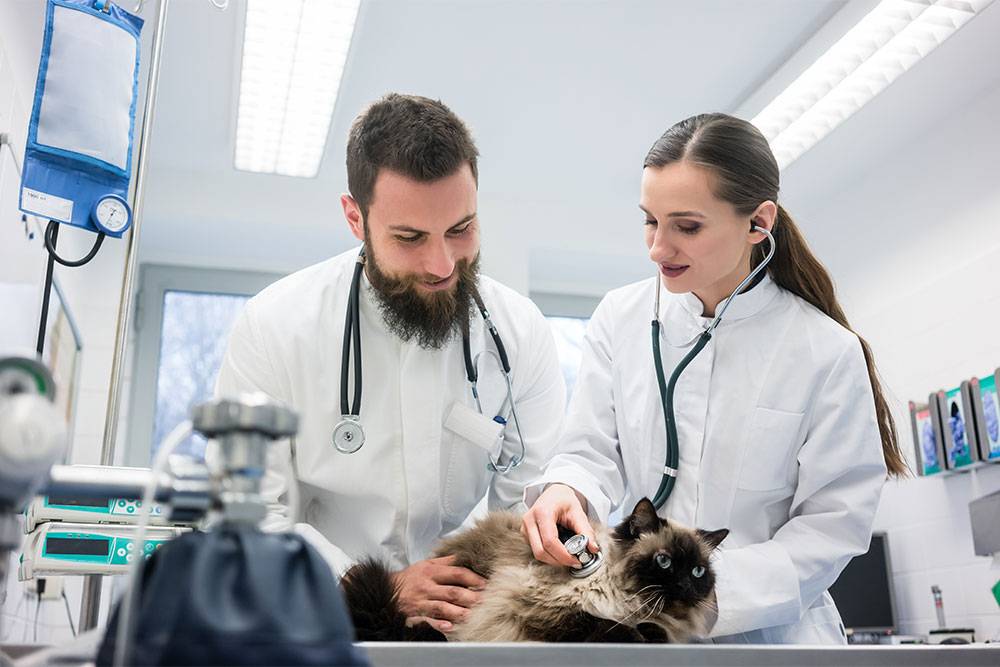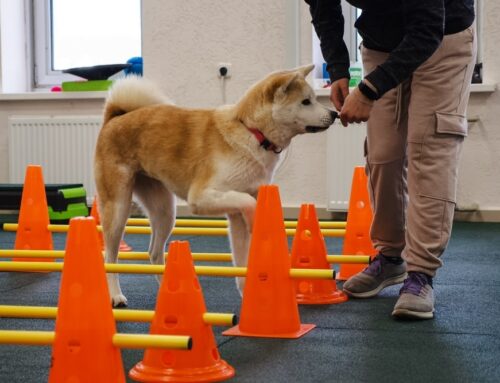Acute pancreatitis is a painful and potentially life-threatening condition that affects both dogs and cats. When severe, it requires immediate veterinary attention—and often hospitalization in an intensive care unit (ICU).
At Omega Veterinary Group in San Mateo, California, we specialize in providing critical care for pets facing medical emergencies like pancreatitis. This guide is designed to help pet owners understand the condition, recognize the warning signs, and know what to expect from ICU-level treatment.
What Is Acute Pancreatitis?
Pancreatitis is the inflammation of the pancreas, a vital organ responsible for producing digestive enzymes and insulin. Inflammation causes these enzymes to activate prematurely, leading the pancreas to begin digesting itself—resulting in severe pain, tissue damage, and, if untreated, potentially fatal complications.
There are two main types:
- Acute Pancreatitis: A sudden, intense inflammation requiring urgent intervention.
- Chronic Pancreatitis: Ongoing or recurrent inflammation that may lead to permanent damage over time.
Learn more from AAHA’s Guide to Pancreatitis in Pets.
What Causes Pancreatitis in Pets?
1. Dietary Triggers
- Consumption of high-fat meals, such as table scraps, can overwhelm the pancreas.
- Sudden changes in diet without proper transition may contribute to flare-ups. Transition tips from Purina.
2. Medical Conditions
- Pets with diabetes, Cushing’s disease, or hypothyroidism are at higher risk.
- Obesity increases systemic inflammation, elevating pancreatitis risk.
- Certain medications, including steroids and chemotherapy drugs, may contribute.
3. Trauma or Toxin Exposure
- Blunt abdominal trauma can inflame the pancreas.
- Toxin ingestion, especially human medications or certain plants, may trigger acute episodes.
Signs & Symptoms: When to Seek Emergency Care
Early intervention is essential. If you observe any of the following symptoms, seek veterinary attention immediately:
Gastrointestinal Signs
- Repeated vomiting or diarrhea
- Loss of appetite (anorexia)
- Abdominal pain or bloating
Systemic and Behavioral Changes
- Weakness or lethargy
- Fever or unusually low body temperature
- Labored breathing or elevated heart rate
Critical Emergency Signs
- Collapse or inability to stand
- Hunched posture or obvious signs of severe pain
- Persistent vomiting despite withholding food
ICU-Level Management for Severe Pancreatitis
When pancreatitis reaches a critical stage, hospitalization and 24/7 intensive care are often required. At Omega Veterinary Group, ICU care is customized for each patient and may include:
1. Continuous Monitoring
- Heart rate, respiration, and blood pressure are tracked constantly.
- Frequent lab work checks kidney/liver function and electrolyte status.
2. Aggressive IV Fluid Therapy
- Hydration is crucial to support circulation and prevent shock.
- Electrolytes like potassium and chloride are replenished as needed.
3. Pain Management
Pancreatitis is extremely painful. Our approach to pain control includes:
- Opioids (e.g., fentanyl, buprenorphine) for severe cases
- Gabapentin or NSAIDs for milder pain (as appropriate)
- Anti-nausea medications such as maropitant or ondansetron
For more on managing pain in critically ill pets, see:
- Merck Vet Manual – Pain Relief Drugs
- Pain Management in Emergency Settings – Veterinary Practice News
4. Nutritional Support
- Mild cases may require 24–48 hours of fasting, followed by a low-fat prescription diet.
- Severe cases often need feeding tubes (e.g., nasogastric) to ensure adequate nutrition without stimulating the pancreas.
For feeding guidelines, visit AAHA’s Healthy Tails Nutrition Resource.

5. Managing Complications
- Blood sugar monitoring: Pancreatitis can cause temporary or permanent diabetes.
- Plasma transfusions: In cases of clotting issues or hemorrhagic pancreatitis.
- Antibiotics: Used only when secondary infections are confirmed.
Recovery & Long-Term Care After ICU Discharge
Discharge Criteria
Pets are discharged when they:
- Can eat and drink independently
- No longer need IV fluids
- Have stabilized vital signs and pain levels
At-Home Management
- Strict low-fat diet (often lifelong)
- Close observation for signs of relapse
- Routine bloodwork to monitor pancreatic enzymes and glucose
Preventing Future Flare-Ups
- Avoid fatty treats and human food.
- Introduce new foods gradually.
- Manage weight, diabetes, and endocrine conditions with your vet’s guidance.
How Omega Veterinary Group Supports Pets with Pancreatitis
At Omega Veterinary Group, we take an integrative approach to treating pancreatitis, combining critical care medicine with long-term wellness planning. Our services include:
- 24/7 ICU and emergency care
- Advanced diagnostics including in-house lab testing and imaging
- Custom nutrition counseling
- Ongoing support for chronic or recurrent cases
Explore our full services or contact us to schedule an urgent evaluation.
Early Action Saves Lives
Pancreatitis is a medical emergency that demands quick recognition and expert intervention. If your pet exhibits symptoms, do not delay—seek care immediately. With ICU treatment, proper pain management, and diligent follow-up, most pets recover well and go on to lead healthy, comfortable lives.
If you have questions about your pet’s symptoms, or if you’re managing a chronic pancreatitis case, reach out to Omega Veterinary Group today. We’re here to provide the expertise, compassion, and 24-hour support your pet needs.






Leave A Comment